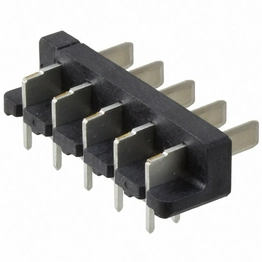Power Connectors
Power Connectors are electrical devices that facilitate the transmission of power from one component to another within a system. They are crucial for maintaining the flow of electricity in various applications, ensuring the safe and efficient transfer of energy.
Definition:
Power connectors are specialized electrical connectors designed to handle high current and voltage loads. They are engineered to provide a robust and reliable connection, often in environments where power delivery is critical.
Function:
1. Transmission of Power: They transfer electrical power from a power source to devices or systems.
2. Safety: They include safety features to prevent electrical shock and ensure the protection of users and equipment.
3. Reliability: They are built to withstand repeated connections and disconnections without loss of performance.
4. Efficiency: They minimize power loss during transmission, ensuring maximum energy utilization.
Applications:
1. Automotive: Used in electric vehicles for charging and internal power distribution.
2. Industrial: Employed in machinery and equipment for power supply and control.
3. : Vital for systems where reliability and durability are paramount.
4. Renewable Energy: Essential in solar panels and wind turbines for efficient power transfer.
5. Data Centers: Used for connecting servers and other equipment to ensure uninterrupted power supply.
Selection Criteria:
1. Current Rating: Choose connectors that can handle the maximum current your system requires.
2. Voltage Rating: Ensure the connectors can withstand the voltage levels in your application.
3. Contact Material: Look for connectors with high-quality contact materials to minimize resistance and corrosion.
4. Environmental Resistance: Consider connectors that can operate in the specific environmental conditions of your application (e.g., temperature, humidity, dust).
5. Mechanical Strength: Select connectors with robust construction to withstand physical stress and vibrations.
6. Certifications: Ensure the connectors meet industry standards and safety certifications relevant to your region or industry.
7. Ease of Use: Consider the ease of installation, maintenance, and the compatibility with existing systems.
In summary, power connectors are essential for the reliable and efficient transfer of electrical power in a wide range of applications. When selecting power connectors, it's important to consider their current and voltage ratings, material quality, environmental resistance, mechanical strength, certifications, and ease of use to ensure they meet the specific needs of your system.
Please refer to the product rule book for details.
Definition:
Power connectors are specialized electrical connectors designed to handle high current and voltage loads. They are engineered to provide a robust and reliable connection, often in environments where power delivery is critical.
Function:
1. Transmission of Power: They transfer electrical power from a power source to devices or systems.
2. Safety: They include safety features to prevent electrical shock and ensure the protection of users and equipment.
3. Reliability: They are built to withstand repeated connections and disconnections without loss of performance.
4. Efficiency: They minimize power loss during transmission, ensuring maximum energy utilization.
Applications:
1. Automotive: Used in electric vehicles for charging and internal power distribution.
2. Industrial: Employed in machinery and equipment for power supply and control.
3. : Vital for systems where reliability and durability are paramount.
4. Renewable Energy: Essential in solar panels and wind turbines for efficient power transfer.
5. Data Centers: Used for connecting servers and other equipment to ensure uninterrupted power supply.
Selection Criteria:
1. Current Rating: Choose connectors that can handle the maximum current your system requires.
2. Voltage Rating: Ensure the connectors can withstand the voltage levels in your application.
3. Contact Material: Look for connectors with high-quality contact materials to minimize resistance and corrosion.
4. Environmental Resistance: Consider connectors that can operate in the specific environmental conditions of your application (e.g., temperature, humidity, dust).
5. Mechanical Strength: Select connectors with robust construction to withstand physical stress and vibrations.
6. Certifications: Ensure the connectors meet industry standards and safety certifications relevant to your region or industry.
7. Ease of Use: Consider the ease of installation, maintenance, and the compatibility with existing systems.
In summary, power connectors are essential for the reliable and efficient transfer of electrical power in a wide range of applications. When selecting power connectors, it's important to consider their current and voltage ratings, material quality, environmental resistance, mechanical strength, certifications, and ease of use to ensure they meet the specific needs of your system.
Please refer to the product rule book for details.
Categories
Datasheets
Article

What Is a Potential Transformer (PT)?
Table of Contents + 1. Basic Definition & Background 1.1. What Is a Potential Transformer? 1.2. PT vs Ordinary Transformer vs Instrument Transformer 1.3. Applications of Potential Transformers / What Are Potential Transformers Used For?2. Operation Principle 2.1. Working Principle of a PT / VT 2.2. Voltage Ratio & Turn Ratio Relationship 2.3....
Learn More >
ICkey Named Intel IoT Solution Aggregator, Marking Strategic Milestone in Partnership
ICkey, a leading distributor of electronic components and provider of digital supply chain solutions, has entered into a strategic partnership with global semiconductor giant Intel, becoming an official Intel IoT Solution Aggregator. To commemorate this milestone, the two companies held a signing ceremony under the theme “Smart Connectivity, Powering the Future.” During the ceremony, Bi Fenglei, Senior ...
Learn More >

ICkey Successfully Lists on Shenzhen Stock Exchange ChiNext Board, Empowering Innovation in the Electronics Industry
On September 30, 2025, ICkey (Shanghai) Internet & Technology Co., Ltd. (ICkey) announced its successful listing on the ChiNext Board of the Shenzhen Stock Exchange under the stock code 301563. As a leading vertical B2B supply chain platform in the electronic components sector, ICkey supports the R&D, production, and procurement needs of the electronics manufacturing industry - specifically targeting small and medium-b...
Learn More >
























